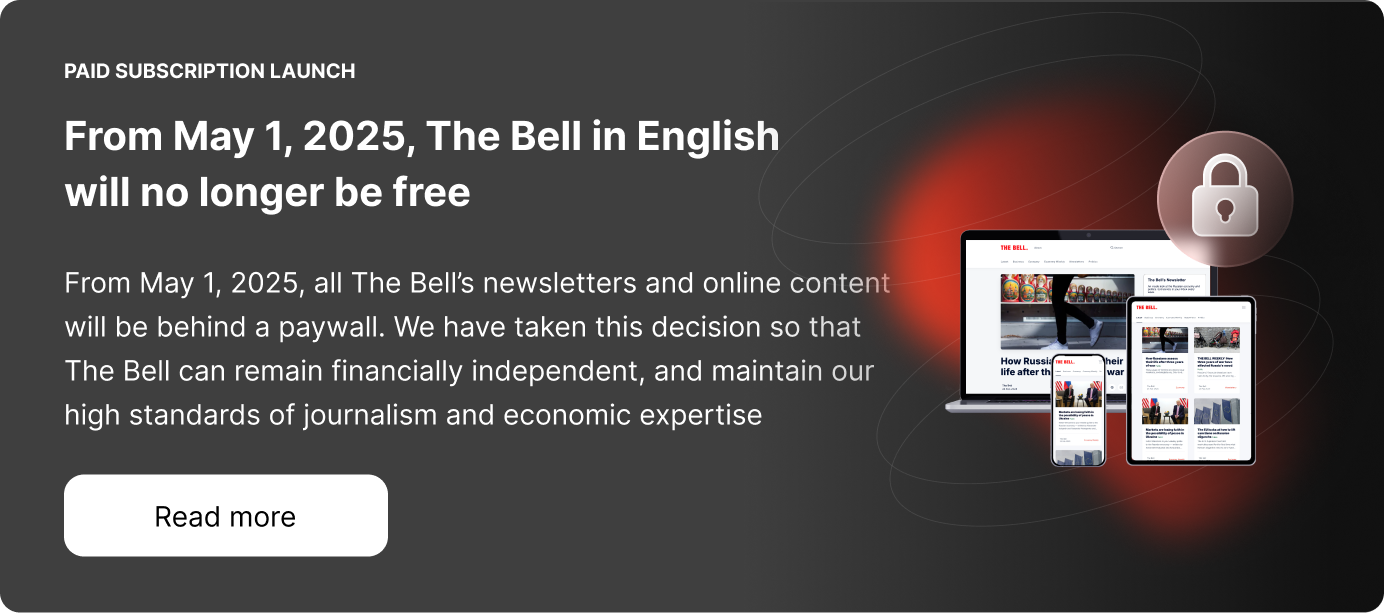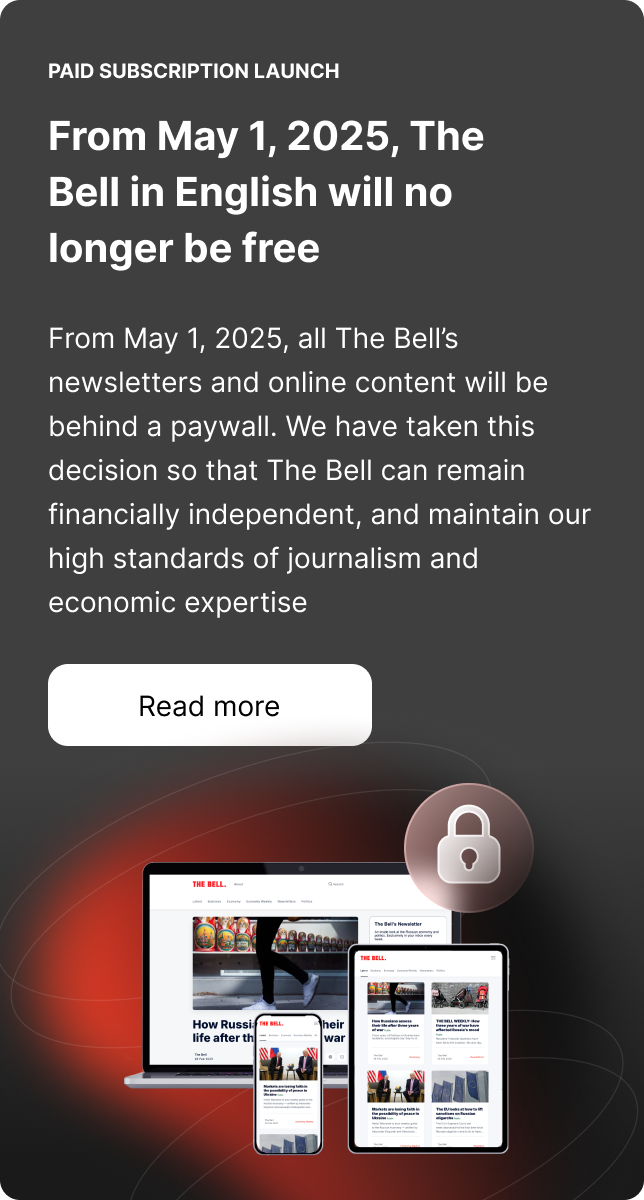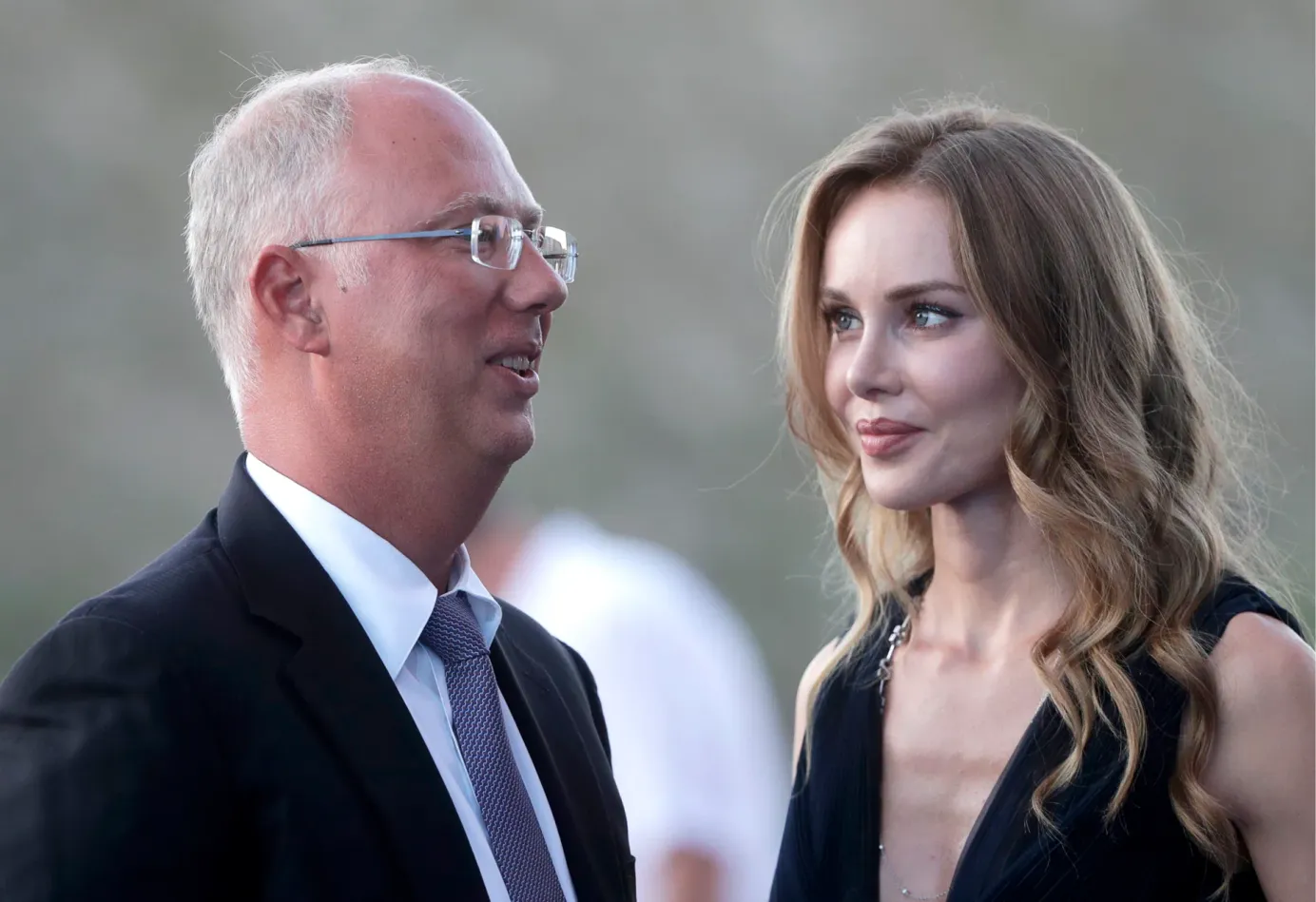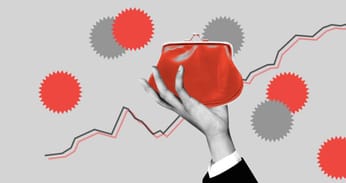
THE BELL WEEKLY: Russia cheers Trump’s tariffs
Hello! Our top story is how Russian propagandists are rejoicing over Donald Trump’s tariffs, but ignoring how they could backfire on Moscow. We also cover new trouble for Anatoly Chubais and how pro-war bloggers are blaming Ukrainian civilians after a deadly Russian missile strike on Kryvyi Rih.
Propagandists revel in US tariffs, ignoring peril to Russian economy
Russian officials and propagandists rushed to portray the United States’ new tariffs as a blow against Europe – completely ignoring the potential consequences it could have on Russia’s domestic economy. The main message on state media has been that the tariffs have divided the EU, while U.S. President Donald Trump is simply doing his best to defend the interests of his own citizens
- Russia’s main Sunday night review show talked up how Germany, Europe’s largest economy, would struggle with the shock tariffs imposed by the Trump regime. Dubbing the U.S. President “the undertaker of German industry,” they claimed that Berlin could no longer afford both sanctions against Russia and a trade war with America. “A trade war with the United States of America, regardless of whether Europe takes part or not, means more and more Germans will look longingly at the ruins of the Nord Stream. Underground gas reservoirs are empty and prices will rocket in August when preparations for the heating season begin,” it said. A reporter on Channel 1 summed it up succinctly: “Europe is in shock.”
- Russia’s print media adopted a similar tone. “Now, when Trump, who promised to revive the American auto industry and strongly defend national interests, hikes tariffs on imported European automobiles, local politicians and manufacturers accuse him of a trade war,” wroteRossiyskaya Gazeta, the official print newspaper of the Russian government.
- At Russia’s biggest information agency, RIA Novosti, one columnist differed from his fellow propagandists, admitting that tariffs will drive up prices in the United States and reduce trade, leading to problems for Trump’s plans to localize production. “However, Trump has the bit between his teeth and has no intention of stopping: he has already promised that he will see it through and the United States is in line for a boom while, at the same time, a loud bang awaits the collective West,” they wrote. By “bang” the author specified they were referring to a process “predicted by the Russian president back in 2022” that sees “the West’s undivided dominance of world affairs come to an end.”
- Several Russian politicians also saw the import tariffs as a legitimate American attempt to restore some fairness in Washington’s relations with Europe. “The EU fleeced the United States for many years when it imposed tariffs on American goods, although European products in the States were free of this. Now, I’m afraid, the free ride is over and Brussels is twitching,” Vladimir Dzhabarov, deputy chairman of the Federation Council’s committee on foreign affairs said in an interview. In the State Duma, the tariffs were described as a “diplomatic-commercial move.”
- Neither politicians nor propagandists bothered to analyze exactly how the Trump administration is calculating its tariffs, nor whether they are fair. In addition, they didn’t mention any possible impact on the Russian economy. Trump has not imposed tariffs on Russia, but a global trade war will certainly affect the country. Our latest economic newsletter explores this in more detail.
Why the world should care:
It’s not a surprise that Russia makes no criticism of tariffs themselves. Propagandists and politicians alike believe in the prospects of a swift normalization of relations with Washington. In their opinion, it also speaks volumes that Trump announced the tariffs when Kirill Dmitriev, the Russian president’s special envoy, was in Washington. His talks were claimed as a success for the Kremlin, despite appearing to have made little impact in the States. Russia believes it won’t be long before the whole world recognizes the “strategic Washington-Moscow-Beijing triangle” that pro-Kremlin international analysts dream of. Nobody has dared to publicly consider the damage to the Russian economy that comes from a global trade war driving down oil prices.
More trouble for Putin’s former aide Chubais
Russian law enforcement agencies have stepped up their targeting of Rusnano, a state company that invested in promising tech projects. For the first time, Anatoly Chubais, one of the architects of Moscow’s 1990s economic reforms and long-time Rusnano chief, is himself coming under direct threat. Until recently, Chubais – who left Russia at the start of the invasion – was seen as untouchable.
- A Moscow court seized property worth 5.6 billion rubles (about $67 million) belonging to Chubais and seven of his subordinates in a case relating to a company called Plastic Logic and the planned production of flexible tablets back in the late 2000s and early 2010s. Rusnano’s new management claims that the project, which was even presented toVladimir Putin, never achieved its goals. The tablets, which allegedly had no equivalent anywhere in the world, were intended to be supplied to schools, but the manufacturing plant in Russia was never built and the funds invested in the project ended up with foreign companies, Rusnano now claims.
- Rusnano’s problems started in 2022 when the corporation's new head asked the prosecutor general’s office to open a probe into the corporation’s activity under Chubais’ leadership, between 2010 and 2020. As a result of the investigation, Plastic Logic’s boss is under arrest along with two former senior managers from Rusnano. As well as the tablet case, authorities are also investigating the theft of $50 million from a Luxembourg-based subsidiary.
- Chubais himself, who served as the Russian President’s special representative for relations with international organizations on sustainable development, quit his positions and left Russia a few weeks after Moscow invaded Ukraine. According to media reports, he was said to be motivated by his opposition to the invasion, though he has not publicly condemned it. Last year he opened a think tank in Israel dedicated to the study of Russia’s post-Soviet history (read more about that here).
- The seizure of Chubais’ property is the first “punishment” he has faced. Rusnano received 405 billion rubles (about $4.8 billion) in state support, but in the end its losses were greater than its income. Chubais is not on Russia’s wanted list and there has been no public confirmation of any criminal case opened against him. However, it is clear he faces problems. Putin himself said in 2023 that Chubais might have left Russia due to the risk of facing a criminal investigation.
Why the world should care
Corporate executives have been jailed for a lot less than Chubais’s failings at Rusnano. But not all of them had personal access to Putin and a long relationship with him dating back to the 1990s. This seizure of property might be a signal that it would be better for Chubais not to consider returning to Russia.
Russian pro-war bloggers blame Ukrainian civilians after deadly missile strike
A Russian strike on the Ukrainian city of Kryvyi Rih on Friday killed 20 people, among them nine children. Images of the aftermath of the strike and details of the devastation triggered anger around the world, more than three years after Moscow's invasion. In Russia, pro-war military bloggers blamed Ukrainian civilians for their own deaths.
- A Russian ballistic missile hit a residential area with a children’s playground nearby, Kryvyi Rih Mayor Aleksandr Vikul said. Russia’s Defense Ministry claimed that it had carried out a “high-precision missile attack with a high-explosive missile on the site of a meeting between unit commanders and Western military instructors in one of the city’s restaurants.” It claimed that “85 servicemen and officers of foreign states” were killed. Russia has not published any evidence to support its statements.
- The attack on Kryvyi Rih, Ukrainian President Volodymyr Zelensky’s home town, was widely discussed on popular pro-war Telegram channels, many of which have hundreds of thousands of subscribers. The deaths of the children were barely mentioned and, when they accepted a strike had taken place, the bloggers blamed Ukrainian civilians themselves.
- The propaganda channel “War on Fakes” (repeatedly endorsed by the Russian authorities), went so far as to claim that there had been no strike on the playground and called it a “provocation” intended to disrupt ceasefire talks.
- Others accepted the strike had occurred but said Russia bore no responsibility for the civilian deaths. “I’m sincerely sorry that civilians were killed. But this is collateral damage, caused by their own carelessness,” wrote Yury Podolyaka (3.1 million followers), a Ukrainian pro-Russian blogger who has lived in Russia since 2014 and raises funds for the Russian army. The “Alex Parker Returns” channel (246,000 followers) published a video after the strike in which a Ukrainian soldier tried to give first aid to children, with the caption: “Where in the playground did the boys in pants and full army rucksacks come from? There wasn’t a military facility nearby? Walking around in helmets and flak jackets near playgrounds.” The Zapiski Veterana channel (339,000 followers) wrote that “if there are civilian casualties, these are collateral damage and were not targeted.”
Why the world should care:
In the fourth year of the war, Russian propaganda has abandoned any hint of decency and is even willing to justify the murder of children. Judging by the reactions of subscribers to pro-war Telegram channels, there are many in Russia that are right behind them.



PAID SUBSCRIPTION LAUNCH
From May 1, 2025, The Bell in English will no longer be free
From May 1, 2025, all The Bell’s newsletters and online content will be behind a paywall. We have taken this decision so that The Bell can remain financially independent, and maintain our high standards of journalism and economic expertise







